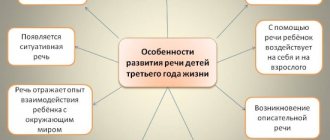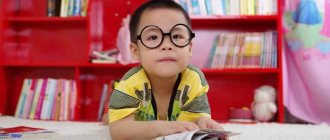Lack of speech in children aged two years often becomes a cause for concern for parents. They are puzzled by questions like how to teach a baby to speak? Is the child developmentally behind his peers? Or maybe you should have sounded the alarm a long time ago and turned to specialists for help?
Parental attitude towards the “silence” of their two-year-old child is divided into two categories:
- Excessive concern. When a child at 18 months does not know the alphabet and does not communicate in detailed sentences, unlike the neighbor's boy Sasha, who at 2 years old spoke in complex sentences.
- Ignoring the problem. When doctors agree on a common opinion and diagnose “developmental delay”, and parents persistently ignore this fact. It seems to them that the baby is absolutely healthy and there is no problem.
The term “speech development delay” (SSD) refers to the slow pace of acquisition of oral speech by children under three years of age.
Normal or pathological?
The development of each child occurs according to an individual schedule, as does the formation of speech. The verbal communication skills of 2-year-old children are so individual that they can differ significantly among peers born within a couple of months of each other. But all children, without exception, experience the main periods of speech development.
Stages and conditional norms of speech development:
- 2-3 months - partying. The baby reacts to the voices of mom and dad. He begins to make his first sounds, responding in his own way to his parents’ calls. At this stage, dialogical speech is formed.
- 4-8 months – babbling. The child repeats the simplest syllables of vowels and consonants (cha-cha, nya-nya-nya, boo-boo). Some mothers are happy when they hear the first word “ma-ma” from their child. In fact, this is a random repeated syllable, the meaning of which the baby is not yet aware of.
- 9-12 months – the baby imitates the speech sounds of adults. During this period, the passive vocabulary is actively replenished (words that he hears and understands, but does not pronounce).
- At 12-18 months, the child pronounces his first conscious words, knows and pronounces the sounds of some animals, understands and responds to requests from adults (“put it down,” “sit down,” “bring it,” “eat”). When pronouncing words, the child may “lose” or “replace” sounds and syllables (kotka – “kotka”).
- 2 years – formation of an active vocabulary. The baby learns to put words into sentences and express his thoughts.
- 3 years – the child’s speech becomes understandable to others. He easily formulates his demands, asks questions, actively uses verbs, conjunctions, prepositions in his speech, and is familiar with quantitative concepts (“many”, “one”).
There is no single age standard according to which a child should speak.
For most children, this occurs from 14-18 months from the moment of their birth.
Role of the family
Family is the first and main environment for children. Close people can become a pathogenic organism that provokes the prosperity of the disease, but, on the other hand, have a beneficial effect on eliminating the defect.
A large role in the formation of logoclonia is played by the educational model. The risk of developing pathology increases in those families where the baby is raised in an environment of authoritarianism, hypersocialization, and increased emotional connection with the mother. The child is not perceived as he is, the right to develop as an individual is taken away, and his rights are infringed upon. Parents do not have an adequate understanding of the baby and his role in society. There is no attention to age needs.
The atmosphere in the family is another provoking factor for logoneurosis. Scandals, showdowns, misunderstandings between parents act as a chronic stressor. Particular importance is given to violence and dictatorship in a family environment. When faced with the problem of logoneurosis, many parents subconsciously choose the wrong path of response. The first reaction is resistance, rejection of the disease, the desire to get rid of the defect as quickly as possible.
Relatives who are little informed about the disease make fatal mistakes in teaching their children. They show increased control, anxiety, and force the baby to repeat phrases several times. The anxiety of loved ones is transmitted to the patient. In such a situation, the defect worsens. The mother's negative attitude towards the disease provokes increased attention to the speech defects of young patients, increasing sensitivity to the problem.
An examination of parents whose children suffer from logoneurosis revealed the following deviations in the mental state of adults, and, above all, the mother: guilt, anxiety, confusion, hopelessness, worry about the future of the baby. Futile attempts to eliminate the disease disorganize the family. Therefore, parents should pay attention to their condition, which is reflected in the psychological background of the little patient.
Based on the data obtained during conversations with mothers of sick children, it was possible to identify the following models of attitude towards the problem:
- an obstacle that needs to be overcome - we tried everything, this is the last hope;
- undeserved punishment, retribution for sins - why do we need this;
- a disease that needs treatment - he is sick because he is weak;
- tarnished reputation - where does this come from in our educated, wonderful family;
- manifestation of a difficult character - grimacing from harmfulness;
- absence of a problem - different things happen, and so it will pass.
All of these positions are destructive in relation to progress in the treatment of logoneurosis. Considering that children in most cases imitate the reactions of adults, it is hardly worth expecting an adequate assessment from the patient himself, and therefore a positive trend in the treatment of logoclonia.
The only correct response to a problem is to unite the family team. WITH
It is necessary to create a favorable atmosphere in the family for children, adequate participation in treatment without overprotection, but with support.
Parents must remember that their behavior has a powerful impact on the potential of their child.
What signs indicate delayed speech development?
There is no need to worry if the baby is sociable, smart, communicates with family members and others using gestures and sounds, responds to your requests, understands the words you say to him, and is capable of onomatopoeia. Such children can stubbornly remain silent until they are three years old, but then they actively begin to talk, even surpassing their peers. We are talking about a tempo delay in speech when the baby spoke on his own, without any measures taken. This is a normal phenomenon that can occur in a completely healthy child. But there is another problem when a delay in speech development is an alarming “bell” signaling serious violations.
What parents should be wary of:
- After 3-4 weeks from the moment of birth, the baby has no reaction to the voices of adults.
- No noise in 2-4 months.
- At 8-9 months, no sounds or babbling are heard from the child.
- At 1-1.5 years old, does not pronounce simple syllables (ma-ma, boo-boo), does not respond to his name.
- Since the age of one and a half years, he has not heard words or requests. There are problems with chewing food.
- Doesn't use gestures, achieves everything only by crying.
- At 2 years old, he cannot speak in phrases, does not strive to learn new words, confuses body parts, does not know the names of elementary objects, and cannot point to them. The vocabulary is scanty, no more than 20 words.
The final diagnosis of RRD can only be made by doctors after a comprehensive examination.
How to help your child say his first words faster?
Speech is closely related to intelligence, so many parents try to get their baby talking quickly and are very worried if he doesn’t want to do this. Today there are many methods for early speech development. You can choose and try one of them, but just don't overdo it. Sometimes too intense exercises have side effects - the child may withdraw into himself from information overload or stop being interested in the world around him, wanting to learn new words only from his favorite educational cartoons. To understand whether a developmental program is causing harm, carefully monitor your child’s behavior and emotional state, and regularly consult with a specialist.
In addition to the author’s methods, there are also universal tips that help parents hear the baby’s first words faster:
- Do not think that your baby will speak faster if you artificially reduce communication with him to the most primitive words. On the contrary, from birth, try to talk with your child on a variety of topics, even abstract ones.
- If your baby is not sleeping, talk to him constantly. Comment on your actions while playing, feeding or changing clothes. While walking, talk about everything you see - trees and flowers, roads and cars, rain and sun, butterflies and birds. Describe each item - what it does, what color it is, size, quantity, what it consists of, etc. If it is connected with something already familiar to the baby, point out this connection.
- Do not fix simplified forms of words in your child’s mind. If your child calls the cat “ko,” confirm that you understand him and say correctly: “yes, that’s a cat.” And, of course, do not invent such words yourself.
- When children begin to speak, it is important to give them opportunities to gain fresh knowledge. Do not limit yourself to the vicious circle of “house, park, playground.” Take your baby to children's events, the zoo, museums and other places where he can get new experiences.
- Read books to your child, show pictures and explain what is shown in them, sing children's songs, look for videos for children on the Internet. All this stimulates the baby’s interest in mastering speech, expands vocabulary and builds logical connections between various objects, actions, phenomena, and properties.
- Praise your child for his achievements. Even if they are very tiny.
What caused the delay in speech development?
The reasons for the development of speech are divided into physiological and social.
Physiological reasons:
- Perinatal pathologies (threat of miscarriage during pregnancy, prematurity, asphyxia during childbirth).
- Heredity.
- Lesions of the central nervous system due to intrauterine and birth injuries, infectious and viral diseases at an early age.
- Hearing impairment.
- Skull injuries.
- Poor development of the speech apparatus, impaired articulation - lips, tongue, facial muscles, soft palate.
- Diseases of a neurological nature.
When a developed and absolutely healthy baby at 2 years old does not speak or does it very poorly, the reasons may be of a social nature:
- The child is deprived of parental attention.
- The baby, on the contrary, is too surrounded by the care of his family and does not feel the need for verbal communication. All his demands are immediately fulfilled, you just need to show with a gesture what he needs. Mothers, having heard a slurred word, immediately understand what it is about. The baby gets used to this attitude and is lazy to talk.
- Unfavorable family environment, constant stress.
- Staying away from mother.
- The family communicates in two or more languages.
- Integrity and stubbornness. The child resists in every possible way the attempts of adults to teach him to speak, showing his character.
- Until the age of 2-3 years, children accumulate vocabulary, and after that they begin to use phrases and extended sentences.
Finger games
The development of fine motor skills stimulates speech centers. Finger games will be useful for early speech.
In this way, you can entertain your baby from the age of six months. Stroking the palm and fingers should be gentle, it is better to do them with warm hands. Children really like funny rhymes and a gentle voice, so you don’t have to force them to study.
Children over three years old are played more emotionally. Expressive facial expressions and emotions in the voice interest and encourage children.
You can start with the simplest game “Magpie”. You can tell a poem about brother fingers and bend each of them.
For older children you can play “Spider”:
The spider wandered along the branch,
And the children followed him - (the child runs the fingers of one hand from the wrist to the shoulder of the other)
Rain suddenly poured from the sky, washing the spider to the ground (shake both hands to imitate rain).
What measures to take in case of ZRR?
If you suspect your baby has a delay in speech development, do not put off visiting a specialist.
It is important to take timely measures, since this problem has a steady increase in dynamics, which will subsequently lead to the formation of a delay in psycho-speech development (DSRD) in the child.
Some parents mistakenly believe that speech therapists treat mental disorders. But they will only teach the child to speak various sounds, make sentences orally, and conduct speech therapy massage of the speech apparatus to improve diction.
In case of mental retardation, in addition to a speech therapist, you will need to consult the following specialists:
- neurologist;
- speech pathologist;
- child psychologist.
Only a specialist will be able to identify the problem, if any, and prescribe the correct treatment.
Why doesn't the child start talking?
The reasons why a child starts speaking late or speaks poorly can be different:
- complications during pregnancy and childbirth;
- genetics;
- damage to the hearing organs;
- lack of microelements;
- nervous system problems;
- social factors in the form of lack of communication with significant adults;
- obstacles organized by adults: pacifiers, use of gadgets, feeding non-solid foods.
First of all, it is important to understand whether the problems relate to the medical or pedagogical sphere in order to know which specialist to contact.
Tempo delay in speech development
A communicative “push” will help to bring the child out of the state of delayed speech. They benefit from communication with speaking peers, speech games and exercises, and classes with a speech therapist, which help children develop speech.
The lion's share of the work on developing the baby's speech will fall on the parents themselves. They are the best teachers for their child.
The tempo delay can be corrected by parents independently. It is enough to approach your work responsibly and devote several hours a day to activities with children.
Techniques and exercises:
- Do not use the TV as background noise, as this negatively affects the speech development of the baby.
- Play educational games. This includes sorters, cubes, cut cards, and inserts.
- Read books, poems, nursery rhymes, and fairy tales to your child before bed.
- Sing funny children's songs and bedtime lullabies.
- Look at pictures of animals with your child and talk about them.
- Watch animated films together, saying the names of the characters and the actions of the heroes.
- Let's drink liquid (compotes, juices, milkshakes) from a straw. This will strengthen the muscles of the mouth and make it easier to reproduce words.
What you should absolutely not do in relation to your baby:
- Compare your child with other people's talking children of friends, relatives, neighbors. Remember that your baby is unique and develops on his own schedule.
- Turn a blind eye to the existing problem. If the baby still shows signs of delayed speech development, you should not let the situation take its course, you should immediately visit a specialist.
- Obsess over. When children at 2 years old have not yet begun to speak, mothers fall into despair. All their thoughts are occupied with one thing: how to make a child speak?
Stuttering in a left-handed person
Currently, the number of supporters of the theory has increased that a left-hander who has been retrained to use his right hand in most cases develops logoneurosis. Evidence of this is the many stories told by adults who suffered similar bitter experiences in childhood.
Male, 50 years old. From early childhood, according to his mother, the boy began to be retrained from being left-handed to being right-handed. As a result, from the age of 5 the guy began to stutter. Since then, the defect has not left him, remaining to this day.
An interesting story happened with another man. The beginning is like everyone else’s: in childhood they retrained from the left hand to the right, which led to stuttering. Soon the boy fell ill with polio and his right arm became paralyzed. The patient had to learn to do everything with his left hand. Having mastered the skills of left-handedness, it was discovered that the defect had disappeared.
Confirmation of the connection between retrained left-handedness and logoneurosis is sufficient. But scientists argue about the mechanisms of this connection.
Some argue: the reason is in the work of the hemispheres. The brain is characterized by the phenomenon of laterality. One hemisphere in humans turns out to be dominant. At the base of the brain there is a crossover of nerve pathways, so in a left-handed person the right hemisphere predominates, in a right-handed person the left hemisphere predominates.
When a left-handed person is retrained, the influence of the left hemisphere, which is weak by nature, increases. It turns out that the control of both hemispheres is equalized. This is unnatural and goes against the natural functioning of the brain. As a result, one of the consequences is stuttering.
Another theory takes as its basis the mental stress under which a child falls during retraining. There are known cases where children had their left arm tied to their body to immobilize them. If they tried to free their “favorite” limb, they were shouted at, even beaten.
Left-handers were dressed in special harnesses that limited the movements of the left limb. They glued the notebook to the desk on the right side. They resorted to other tricks. And even though over time the methods of retraining have softened and become more cultural, the tension does not go away.
For an emotional child, increased tension and control are a great test, the outcome of which is neurosis. One of the symptoms of neurosis is stuttering.
In general, it becomes clear that retraining a left-handed person carries certain risks regarding the occurrence of laloneurosis.
About the benefits of articulation gymnastics and breathing exercises
To teach a child to speak and clearly pronounce sounds, talking and communicating with him alone will not be enough. It is important to do articulation gymnastics at the same time. Training the articulatory apparatus contributes to the correct pronunciation of words in the future.
Below are several articulation gymnastics exercises. Demonstrate and explain to your child how to perform them. He will love this fun idea.
"Pendulum". Open your mouth and move your tongue like a pendulum from side to side, touching the corners of your mouth.
Using your tongue, try to reach the tip of your nose, chin, and cheeks.
"Fence". You need to close your teeth tightly so that your tongue remains behind the fence, and smile widely.
“Open and close your mouth.” Having opened your mouth, you need to stay in this position for a few seconds and then close it.
"Baby Elephant's Trunk" Pull your lips forward like a tube and breathe.
"Piglet." Move your elongated lips in a circle, left and right, up and down.
"Hamster". Take a breath into your mouth, pretending to be a hamster. Alternately deflate the left and right cheek. Then, on the contrary, pull in your cheeks strongly. Inflate and use your palms to deflate them.
Conclusions on how to teach a child to talk
- The child learns to speak on his own, but without a parent he will not be able to do this.
- If you communicate a lot with your baby, then this is already enough.
- But you can diversify your repertoire with reading and interesting activities.
- If you understand that your child is not making the expected achievements in language acquisition, do not panic, but consult a specialist.
- You should not use articulatory gymnastics or speech therapy poetry without the appointment of a specialist.
- Spontaneously and joyfully use speech and facial expressions, accompanying joint activities with them.
- Try to remove obstacles to speech development:
- nipples;
- lisp and imitation of children's words;
- too complex words and long sentences;
- predicting what the child is trying to say and monologues instead of dialogues with him;
- taking only liquid food by those who have acquired teeth can chew and thereby train the muscles of the speech apparatus;
- screens in the child’s field of vision.
We would like to thank psychologists and Montessori teachers Anastasia Kuznetsova and Anna Fedosova for their assistance in preparing this article.
Photos by Irina Antonova, Yulia Vorobyova, Anna Efremova, Anastasia Zotova, Maria Luchaninova








